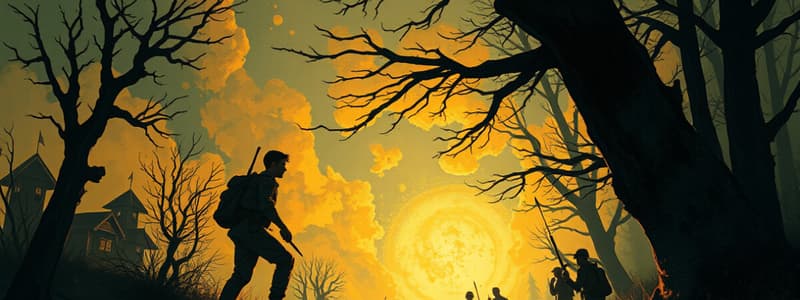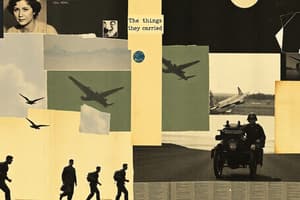Podcast
Questions and Answers
What is the central theme presented in 'The Things They Carried'?
What is the central theme presented in 'The Things They Carried'?
Courage vs cowardice / Fear
What does O'Brien mean when he says 'they carried the soldier's greatest fear'?
What does O'Brien mean when he says 'they carried the soldier's greatest fear'?
The fear of blushing.
What is the significance of the repetition of the word 'carried' in the title?
What is the significance of the repetition of the word 'carried' in the title?
It emphasizes the emotional and physical burdens that soldiers endure.
What paradox does O'Brien present in 'On the Rainy River'?
What paradox does O'Brien present in 'On the Rainy River'?
How does O'Brien describe the young Vietnamese soldier he killed?
How does O'Brien describe the young Vietnamese soldier he killed?
What does O'Brien suggest is the true reason soldiers kill in 'Ambush'?
What does O'Brien suggest is the true reason soldiers kill in 'Ambush'?
In 'Notes', what does O'Brien believe is more important than factual truth in storytelling?
In 'Notes', what does O'Brien believe is more important than factual truth in storytelling?
What allegory does O'Brien use in 'Speaking of Courage'?
What allegory does O'Brien use in 'Speaking of Courage'?
What realization does O'Brien come to about his character after time in Vietnam?
What realization does O'Brien come to about his character after time in Vietnam?
How does O'Brien relate death to storytelling in 'The Lives of the Dead'?
How does O'Brien relate death to storytelling in 'The Lives of the Dead'?
What is the ultimate message O'Brien conveys through his storytelling?
What is the ultimate message O'Brien conveys through his storytelling?
Flashcards are hidden until you start studying
Study Notes
The Things They Carried
- Tautological repetition of "carried" underscores the emotional burdens of soldiers; evokes a sense of wars' endless nature.
- O'Brien challenges the myth of heroic war participation; soldiers navigate fear of societal shame rather than a pursuit of glory.
- The concept of cowardice juxtaposes courage, suggesting embarrassment influences soldiers' actions more than instinct or ideology.
- O'Brien's personal conflict during the Vietnam War emphasizes the struggle between societal expectations and personal convictions.
Spin
- Memory and trauma intertwine, with O'Brien likening his writing to a rehappening of past events, illustrating the permanence of wartime experiences.
On the Rainy River
- Paradox in O'Brien's decision to engage in war based on cowardice highlights societal contradictions; bravery is often redefined by cultural expectations.
- Analysis reveals that true courage lies in challenging societal norms rather than conforming to them, presenting a complex view of heroism.
The Man I Killed
- A visceral description of the aftermath of killing a Vietnamese soldier reveals the weight of guilt and trauma on O'Brien.
- O'Brien's clinical observation style attempts to distance himself from the act of killing, yet it underscores the humanity of both the victim and the perpetrator.
Ambush
- O'Brien excavates the reasons behind killing, asserting that immediate fear rather than political motivation drove his actions.
- Repetitive structure emphasizes the complexity of moral reasoning in combat; questions preconceived notions about enemy engagement.
Notes
- O'Brien addresses Norman Bowker's feelings of aimlessness post-war through reflective storytelling, utilizing story as a coping mechanism for trauma.
- Contest between factual and emotional truth in storytelling illustrates the significance of narrative in processing experiences rather than mere accuracy.
Speaking of Courage
- O'Brien employs an allegory where Bowker's circling the lake symbolizes memory retrieval, emphasizing the nonlinear nature of recollecting past traumas.
- Antithetical movements in Bowker's mindset highlight his disconnection from the future due to his war experiences.
The Ghost Soldiers
- O'Brien confronts the darker aspects of his character shaped by war; acknowledges a shift from peace to a capacity for cruelty.
- Academic achievements contrast with wartime brutality, showing inner conflict between past identity and the challenges faced during combat.
The Lives of the Dead (1)
- O'Brien compares death to unread books, positioning storytelling as a mechanism to preserve memory and maintain connection to the deceased.
- Spiritual life persists through memory, suggesting that stories breathe life into the past and counteract the finality of physical death.
The Lives of the Dead (2)
- Juxtaposition of childhood death and war experiences expands O'Brien's exploration of grief and storytelling's comforting role in processing loss.
- Storytelling serves as an avenue for immortality; it allows both the deceased and the storyteller to exist vibrantly through shared narratives.
Studying That Suits You
Use AI to generate personalized quizzes and flashcards to suit your learning preferences.




